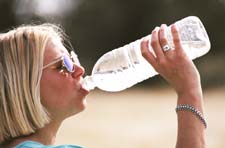Water: the fourth food group
by Tom Ballard, RN, ND
This article was originally published in August 2005

(August 2005) — Water doesn’t appear on most food charts or pyramids, but it is critical. You could argue that it’s more important than grains because you can’t live without water, but you can live without bread.
Water was the main drink of hunter-gatherers and fell into disfavor only as humans started living in unsanitary towns and poisoned their water supplies. Then beer and wine became popular. Alcohol helped build the pyramids and much of civilization. Today, juices, soda pop and coffee fuel the day.
Alarmingly, in the United States, more soda is consumed than water. The average yearly intake of soda is 40 gallons — a frightening experiment in ingesting fructose, corn syrup and artificial colors and sweeteners.
Researchers commonly find mild to moderate dehydration in average people. Dehydration is not a benign condition. It reduces the efficiency of the cells to carry out their processes — chemical reactions slow down, nutrients stagnate, waste removal is delayed. This translates into reduced body energy.
Most weight-loss diets recommend water as an important tool for increasing metabolism. Research (Journal of Clinical Endocrinology and Metabolism, December 2003) shows that water intake increases the rate at which people burn calories. A little more than two cups of water a day increased metabolism by an amazing 30 percent. This boost takes place within 10 minutes of drinking water. Researchers estimated that by consuming 1.5 liters of water a day the average person would burn an extra 17,400 calories annually, for a weight loss of approximately five pounds.
Sometimes people eat, or drink calorie beverages when they are not really hungry, only thirsty. For instance, a recent study found that kids who drink more than three glasses of milk a day are prone to obesity and suggested they would be better off drinking more water.
How much water?
As you might guess, not a lot of money has gone into water research — except when it’s “fortified” as a sports drink. Most experts tend to use the figure of eight glasses of water each day. Those who work or exercise heavily need even more. If you have a tendency toward constipation, kidney or gallstones, water may keep you out of the emergency room. Some doctors recommend one gallon a day. As the research above showed, 1.5 liters increased metabolism, so that seems a reasonable goal.
If you have a concern about additional water making it necessary for you to urinate too often, gradually increase your water over several weeks. If urination disturbs your sleep, drink the majority of your water before 3 p.m.
Can’t stand the taste? A good filter, changed regularly, does wonders. Some people find that a squeeze of pure lemon or a tablespoon of organic fruit juice “turns on” their tongue.
Water with meals?
Some lay authors advise not to drink fluids during a meal. They claim this will dilute digestive enzymes and reduce digestive function. I never have seen this supported in any research studies or mentioned in nutrition textbooks.
- Most animals drink water, when available, with their food.
- If you have trouble digesting foods, don’t stop drinking water; have your digestive function evaluated.
- You don’t want to drink large amounts of water with a meal, but sipping a glass is fine.
What about other drinks?
I suggest sticking with what humans drank traditionally — water. Other acceptable beverages are herbal and green teas and very diluted fruit juices. Full-strength fruit juices have too much sugar, not enough fiber and high concentrations of pesticides, unless they’re organic.
Coffee and caffeinated teas and sodas are diuretics — they stimulate the kidneys to lose water through urination. Think of them as anti-water. They increase your need for real water. A recent study sponsored by The Coca-Cola Company disputes this, but it was a pilot study only lasting one day and even it demonstrated a decrease in potassium among caffeinated beverage drinkers.
If you like coffee, drink it the way you would any herb or condiment; in small doses, organic and with food — not alone. My major concern about coffee is that some people use it as a source of energy. If your energy is not good, do something about the problem; don’t cover it up with a stimulant.
Bottle or tap water?
Many bottled waters are no more pure than good tap water, depending on where you live. If the bottle is a soft plastic container, the plastic is known to leach into the water and has been associated with hormonal disruption and cancer.
In addition, every time you purchase bottled water, you’re helping to privatize what has been a public resource. Analysts expect three companies will control 65 to 75 percent of what are now public waterworks in Europe and North America in the next 15 years.
Home water filtration systems do a good job of removing problem chemicals and contaminants and are less expensive. Filters are also more environmentally friendly and save room in your recycling bin. Check with Consumer Reports to find the best quality filtering system.
Water more precious than oil
Growing scarcity of clean water for drinking has lead many environmental experts to predict that nations will soon be competing for water as viciously as they now battle for oil. Modern non-organic farming practices have increased the poisoning of the water table and the evaporation of water resources. It’s a sad state of affairs that leaves us now viewing a natural resource as a commodity.
Water, the evolutionary drink that has found no superior. Value it, preserve it, drink it.
Tom Ballard, RN, ND, has been in private practice and teaching in Seattle for 23 years. He may be contacted at the Institute of Complementary Medicine, 206-726-0034.
